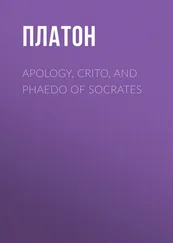Платон - Phaedo
Здесь есть возможность читать онлайн «Платон - Phaedo» весь текст электронной книги совершенно бесплатно (целиком полную версию без сокращений). В некоторых случаях можно слушать аудио, скачать через торрент в формате fb2 и присутствует краткое содержание. Год выпуска: 2014, Издательство: epubBooks Classics, Жанр: Философия, на английском языке. Описание произведения, (предисловие) а так же отзывы посетителей доступны на портале библиотеки ЛибКат.
- Название:Phaedo
- Автор:
- Издательство:epubBooks Classics
- Жанр:
- Год:2014
- ISBN:нет данных
- Рейтинг книги:3 / 5. Голосов: 1
-
Избранное:Добавить в избранное
- Отзывы:
-
Ваша оценка:
- 60
- 1
- 2
- 3
- 4
- 5
Phaedo: краткое содержание, описание и аннотация
Предлагаем к чтению аннотацию, описание, краткое содержание или предисловие (зависит от того, что написал сам автор книги «Phaedo»). Если вы не нашли необходимую информацию о книге — напишите в комментариях, мы постараемся отыскать её.
Phaedo — читать онлайн бесплатно полную книгу (весь текст) целиком
Ниже представлен текст книги, разбитый по страницам. Система сохранения места последней прочитанной страницы, позволяет с удобством читать онлайн бесплатно книгу «Phaedo», без необходимости каждый раз заново искать на чём Вы остановились. Поставьте закладку, и сможете в любой момент перейти на страницу, на которой закончили чтение.
Интервал:
Закладка:
All of us, as we afterwards remarked to one another, had an unpleasant feeling at hearing what they said. When we had been so firmly convinced before, now to have our faith shaken seemed to introduce a confusion and uncertainty, not only into the previous argument, but into any future one; either we were incapable of forming a judgment, or there were no grounds of belief.
ECHECRATES: There I feel with you—by heaven I do, Phaedo, and when you were speaking, I was beginning to ask myself the same question: What argument can I ever trust again? For what could be more convincing than the argument of Socrates, which has now fallen into discredit? That the soul is a harmony is a doctrine which has always had a wonderful attraction for me, and, when mentioned, came back to me at once, as my own original conviction. And now I must begin again and find another argument which will assure me that when the man is dead the soul survives. Tell me, I implore you, how did Socrates proceed? Did he appear to share the unpleasant feeling which you mention? or did he calmly meet the attack? And did he answer forcibly or feebly? Narrate what passed as exactly as you can.
PHAEDO: Often, Echecrates, I have wondered at Socrates, but never more than on that occasion. That he should be able to answer was nothing, but what astonished me was, first, the gentle and pleasant and approving manner in which he received the words of the young men, and then his quick sense of the wound which had been inflicted by the argument, and the readiness with which he healed it. He might be compared to a general rallying his defeated and broken army, urging them to accompany him and return to the field of argument.
ECHECRATES: What followed?
PHAEDO: You shall hear, for I was close to him on his right hand, seated on a sort of stool, and he on a couch which was a good deal higher. He stroked my head, and pressed the hair upon my neck—he had a way of playing with my hair; and then he said: To–morrow, Phaedo, I suppose that these fair locks of yours will be severed.
Yes, Socrates, I suppose that they will, I replied.
Not so, if you will take my advice.
What shall I do with them? I said.
To–day, he replied, and not to–morrow, if this argument dies and we cannot bring it to life again, you and I will both shave our locks; and if I were you, and the argument got away from me, and I could not hold my ground against Simmias and Cebes, I would myself take an oath, like the Argives, not to wear hair any more until I had renewed the conflict and defeated them.
Yes, I said, but Heracles himself is said not to be a match for two.
Summon me then, he said, and I will be your Iolaus until the sun goes down.
I summon you rather, I rejoined, not as Heracles summoning Iolaus, but as Iolaus might summon Heracles.
That will do as well, he said. But first let us take care that we avoid a danger.
Of what nature? I said.
Lest we become misologists, he replied, no worse thing can happen to a man than this. For as there are misanthropists or haters of men, there are also misologists or haters of ideas, and both spring from the same cause, which is ignorance of the world. Misanthropy arises out of the too great confidence of inexperience;—you trust a man and think him altogether true and sound and faithful, and then in a little while he turns out to be false and knavish; and then another and another, and when this has happened several times to a man, especially when it happens among those whom he deems to be his own most trusted and familiar friends, and he has often quarreled with them, he at last hates all men, and believes that no one has any good in him at all. You must have observed this trait of character?
I have.
And is not the feeling discreditable? Is it not obvious that such an one having to deal with other men, was clearly without any experience of human nature; for experience would have taught him the true state of the case, that few are the good and few the evil, and that the great majority are in the interval between them.
What do you mean? I said.
I mean, he replied, as you might say of the very large and very small, that nothing is more uncommon than a very large or very small man; and this applies generally to all extremes, whether of great and small, or swift and slow, or fair and foul, or black and white: and whether the instances you select be men or dogs or anything else, few are the extremes, but many are in the mean between them. Did you never observe this?
Yes, I said, I have.
And do you not imagine, he said, that if there were a competition in evil, the worst would be found to be very few?
Yes, that is very likely, I said.
Yes, that is very likely, he replied; although in this respect arguments are unlike men—there I was led on by you to say more than I had intended; but the point of comparison was, that when a simple man who has no skill in dialectics believes an argument to be true which he afterwards imagines to be false, whether really false or not, and then another and another, he has no longer any faith left, and great disputers, as you know, come to think at last that they have grown to be the wisest of mankind; for they alone perceive the utter unsoundness and instability of all arguments, or indeed, of all things, which, like the currents in the Euripus, are going up and down in never–ceasing ebb and flow.
That is quite true, I said.
Yes, Phaedo, he replied, and how melancholy, if there be such a thing as truth or certainty or possibility of knowledge—that a man should have lighted upon some argument or other which at first seemed true and then turned out to be false, and instead of blaming himself and his own want of wit, because he is annoyed, should at last be too glad to transfer the blame from himself to arguments in general: and for ever afterwards should hate and revile them, and lose truth and the knowledge of realities.
Yes, indeed, I said; that is very melancholy.
Let us then, in the first place, he said, be careful of allowing or of admitting into our souls the notion that there is no health or soundness in any arguments at all. Rather say that we have not yet attained to soundness in ourselves, and that we must struggle manfully and do our best to gain health of mind—you and all other men having regard to the whole of your future life, and I myself in the prospect of death. For at this moment I am sensible that I have not the temper of a philosopher; like the vulgar, I am only a partisan. Now the partisan, when he is engaged in a dispute, cares nothing about the rights of the question, but is anxious only to convince his hearers of his own assertions. And the difference between him and me at the present moment is merely this—that whereas he seeks to convince his hearers that what he says is true, I am rather seeking to convince myself; to convince my hearers is a secondary matter with me. And do but see how much I gain by the argument. For if what I say is true, then I do well to be persuaded of the truth, but if there be nothing after death, still, during the short time that remains, I shall not distress my friends with lamentations, and my ignorance will not last, but will die with me, and therefore no harm will be done. This is the state of mind, Simmias and Cebes, in which I approach the argument. And I would ask you to be thinking of the truth and not of Socrates: agree with me, if I seem to you to be speaking the truth; or if not, withstand me might and main, that I may not deceive you as well as myself in my enthusiasm, and like the bee, leave my sting in you before I die.
And now let us proceed, he said. And first of all let me be sure that I have in my mind what you were saying. Simmias, if I remember rightly, has fears and misgivings whether the soul, although a fairer and diviner thing than the body, being as she is in the form of harmony, may not perish first. On the other hand, Cebes appeared to grant that the soul was more lasting than the body, but he said that no one could know whether the soul, after having worn out many bodies, might not perish herself and leave her last body behind her; and that this is death, which is the destruction not of the body but of the soul, for in the body the work of destruction is ever going on. Are not these, Simmias and Cebes, the points which we have to consider?
Читать дальшеИнтервал:
Закладка:
Похожие книги на «Phaedo»
Представляем Вашему вниманию похожие книги на «Phaedo» списком для выбора. Мы отобрали схожую по названию и смыслу литературу в надежде предоставить читателям больше вариантов отыскать новые, интересные, ещё непрочитанные произведения.
Обсуждение, отзывы о книге «Phaedo» и просто собственные мнения читателей. Оставьте ваши комментарии, напишите, что Вы думаете о произведении, его смысле или главных героях. Укажите что конкретно понравилось, а что нет, и почему Вы так считаете.










